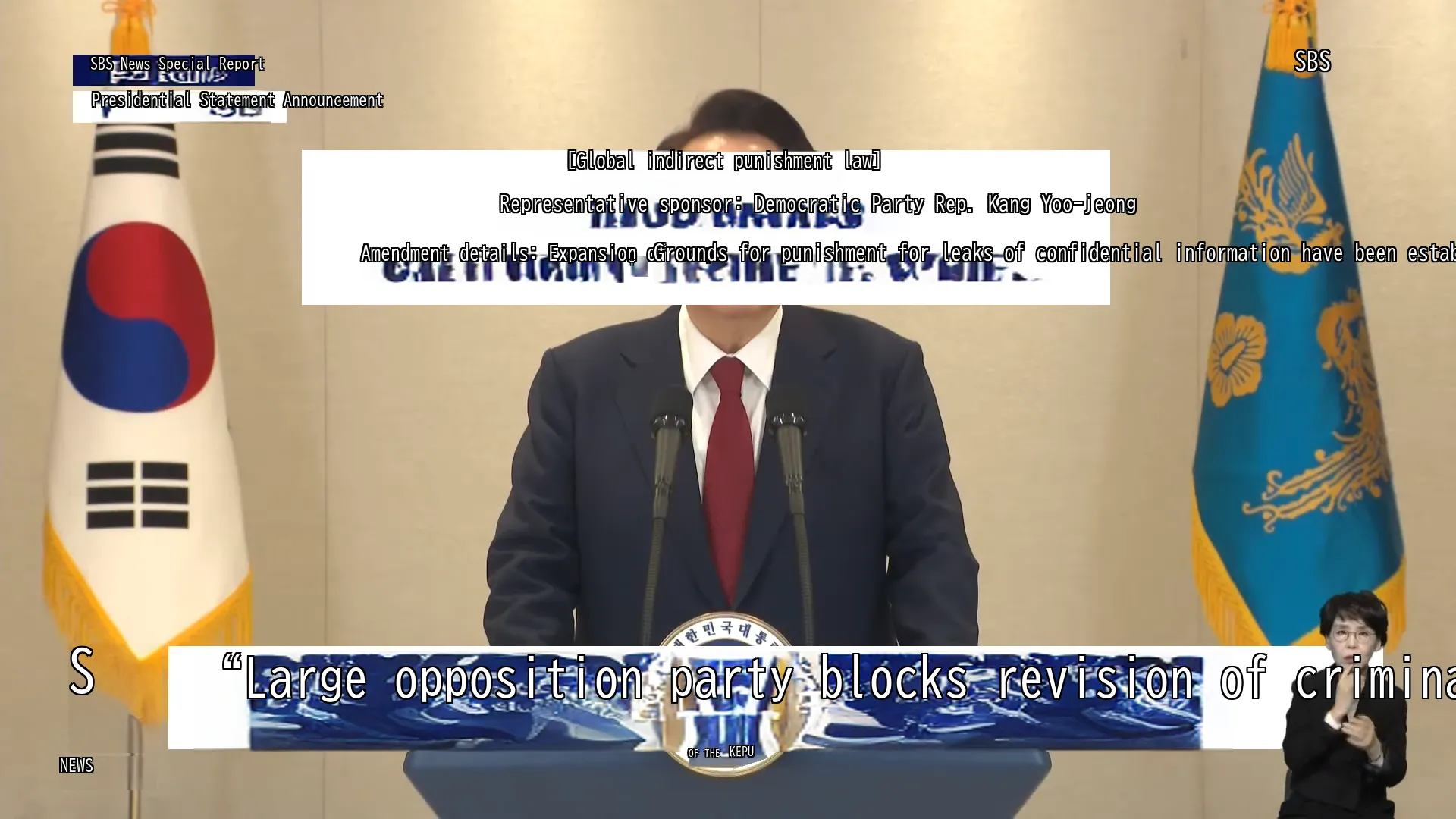
image text translation
SBS News Special Report
SBS
Presidential Statement Announcement
[Global indirect punishment law]
Representative sponsor: Democratic Party Rep. Kang Yoo-jeong
Amendment details: Expansion of scope
+
Grounds for punishment for leaks of confidential information have been established.
S
“Large opposition party blocks revision of criminal law provisions”
OF THE
NEWS
KEPU
[threshold]
– 12.12. Among the insurrection leader’s statements, there was a statement that the Democratic Party blocked the revision of the espionage law proposed by the Democratic Party.
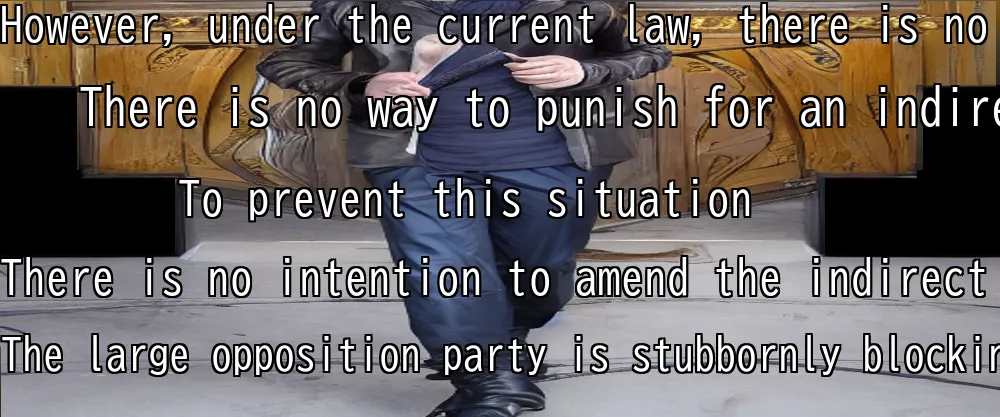
image text translation
However, under the current law, there is no framework for indirect actions by foreigners.
There is no way to punish for an indirect crime.
To prevent this situation
There is no intention to amend the indirect crime provisions of the criminal law.
The large opposition party is stubbornly blocking it.
[Main text]
–
The goal is to expand the scope (foreign countries and foreign organizations) + expand the target (including military personnel) + expand the purpose (including leaks of confidential information).
There was a proposal for the Espionage Punishment Act (Amendment to Article 98 of the Criminal Act) initiated by the Democratic Party.

image text translation
Subject to punishment for indirect crimes
This law, which extends from an enemy country (North Korea) to foreign countries,
Democratic Party in the 19th, 20th, and 27th National Assembly
This is a law that has been proposed over and over again.
In addition, Rep. Kang’s bill, unlike the previously proposed amendments to indirect laws, allows enemy countries and foreign foreign groups to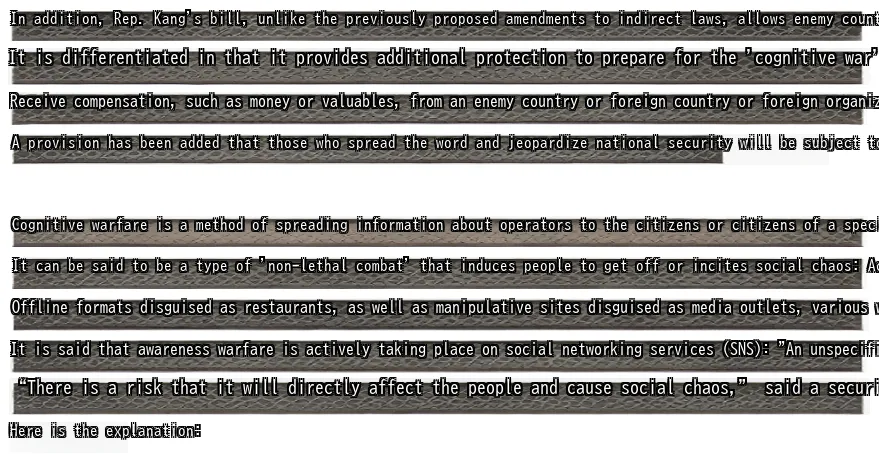
image text translation
It is differentiated in that it provides additional protection to prepare for the ‘cognitive war’ against the Linaratl:
Receive compensation, such as money or valuables, from an enemy country or foreign country or foreign organization, and distort or manipulate information or create false information.
A provision has been added that those who spread the word and jeopardize national security will be subject to imprisonment for more than five years:
Cognitive warfare is a method of spreading information about operators to the citizens or citizens of a specific country, which can lead to wrong decisions.
It can be said to be a type of ‘non-lethal combat’ that induces people to get off or incites social chaos: Academic Club
Offline formats disguised as restaurants, as well as manipulative sites disguised as media outlets, various websites familiar to the general public
It is said that awareness warfare is actively taking place on social networking services (SNS): “An unspecified number of people
“There is a risk that it will directly affect the people and cause social chaos,” said a security expert.
Here is the explanation:
https://www.segye.com/newsView/20240801516655
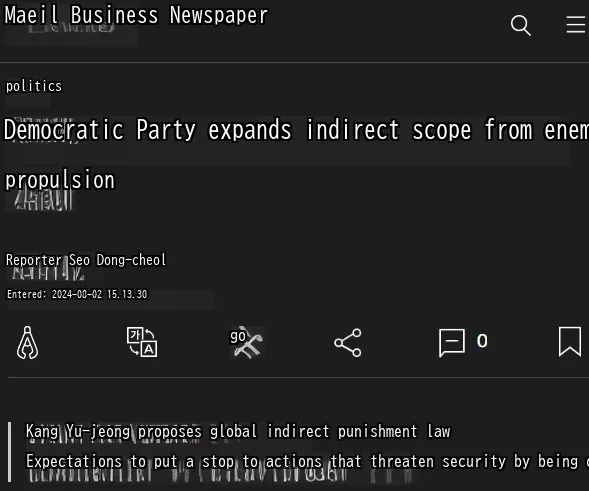
image text translation
Maeil Business Newspaper
politics
Democratic Party expands indirect scope from enemy countries to foreign countries
propulsion
Reporter Seo Dong-cheol
Entered: 2024-08-02 15.13.30
go
Kang Yu-jeong proposes global indirect punishment law
Expectations to put a stop to actions that threaten security by being captured by foreign countries
Kang Yoo-jeong, a member of the Democratic Party of Korea, said in the scope of national security (North Korea)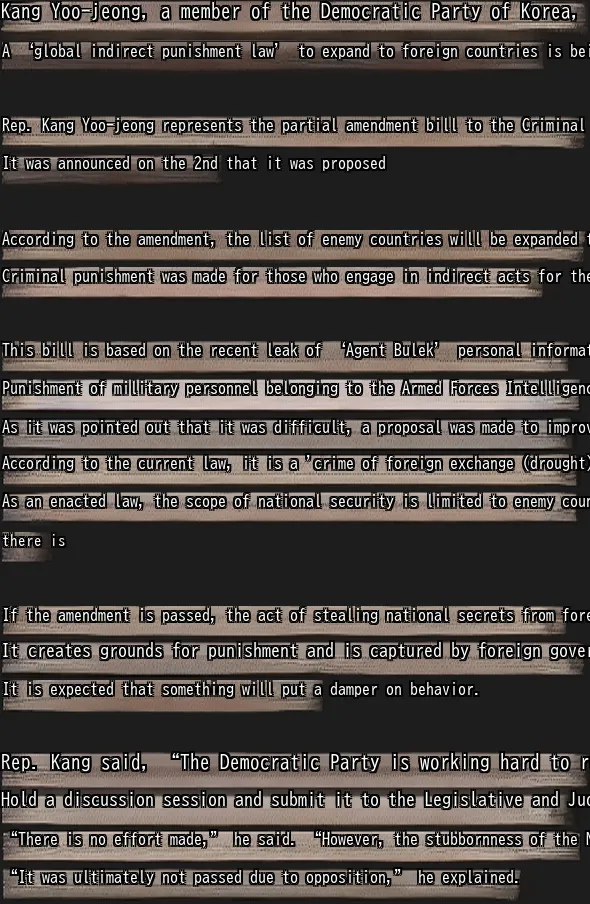
image text translation
A ‘global indirect punishment law’ to expand to foreign countries is being proposed.
Rep. Kang Yoo-jeong represents the partial amendment bill to the Criminal Act that contains these contents.
It was announced on the 2nd that it was proposed
According to the amendment, the list of enemy countries will be expanded to include foreign countries and only foreign countries or foreigners will be included.
Criminal punishment was made for those who engage in indirect acts for the sake of siege.
This bill is based on the recent leak of ‘Agent Bulek’ personal information, etc.
Punishment of military personnel belonging to the Armed Forces Intelligence Command for indirect harassment of Mr. A
As it was pointed out that it was difficult, a proposal was made to improve the shortcomings.
According to the current law, it is a ‘crime of foreign exchange (drought)’ considering the war situation.
As an enacted law, the scope of national security is limited to enemy countries (North Korea).
there is
If the amendment is passed, the act of stealing national secrets from foreign countries will be prohibited.
It creates grounds for punishment and is captured by foreign governments, threatening national security.
It is expected that something will put a damper on behavior.
Rep. Kang said, “The Democratic Party is working hard to revise the indirect law discussed in the 21st National Assembly.”
Hold a discussion session and submit it to the Legislative and Judiciary Committee as an agenda item for review 5 to 6 times.
“There is no effort made,” he said. “However, the stubbornness of the National Court Administration
“It was ultimately not passed due to opposition,” he explained.
https://m.mk.co.kr/news/politics/11083582
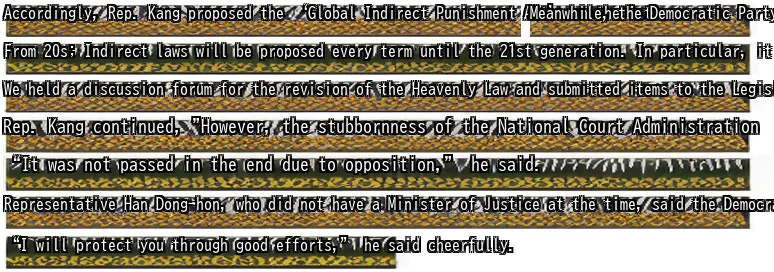
image text translation
Accordingly, Rep. Kang proposed the ‘Global Indirect Punishment Act’ on the 1st.
Meanwhile, the Democratic Party of Korea in the 19th National Assembly
From 20s; Indirect laws will be proposed every term until the 21st generation. In particular, it was discussed in the 21st National Assembly.
We held a discussion forum for the revision of the Heavenly Law and submitted items to the Legislative and Judiciary Committee for review 5 to 6 times.
Rep. Kang continued, “However, the stubbornness of the National Court Administration
“It was not passed in the end due to opposition,” he said.
Representative Han Dong-hon, who did not have a Minister of Justice at the time, said the Democratic Party was reluctant to get caught up in the frame fight.
“I will protect you through good efforts,” he said cheerfully.
https://www.m-joongang.com/news/articleView.html?idxno=340086
– The bill was passed despite strong opposition from the National Court Administration (Minister of Justice at the time: Han Dong-hoon)
(Criminal Law Amendment)
is blocked.
Afterwards, many tug-of-wars broke out between the ruling and opposition parties over the revision.

image text translation
Criminal Act Partial Amendment Act (10 members including Rep. Anju Ho-yeong) Proposal date: 2024.06.21 Date of resolution
The main content of the reason for the proposal is that the current crime is limited to ‘military secrets’ within the framework of the simple railroad, such as making a railroad for the sake of an ‘enemy country’ or aiding and abetting the listening of an ‘enemy country’.
However, there is an end to the total system and a comprehensive security reform. As things are becoming more and more ambiguous, the details are not limited to state secrets.
Scope: In order to prevent the loss of the non-yang commercial season, the loss of the country, let’s change the scope of application of the indirect crime to fit the situation.
Partial revision of the Criminal Act by 12 people including Rep. In Yo-han) Proposal date: 2024.07.31 Date of resolution
Main contents of the reason for the proposal – The current law punishes ‘those who have betrayed or aided the enemy for the crime of leaking to the enemy the military ideology’.
However, as the international situation has become more multi-year, the team paper that was used in the past has changed. collection
Storage. Susul – Increasing latitude also poses a significant risk to national security.
There is a need to revise Gancheol Choi’s name so that he can be punished, and the meaning of ‘Gancheol Port’ and ‘military secrets’ needs to be clarified.
Criminal Law Partial Amendment Act (11 people including Assemblyman Angang Yu-jeong) Proposal date: 2024.08.01 Date of resolution
Angou Bangguk . #They are embracing all friendly countries, and they are threatening our country’s national security plan for their own interests.
The ship that threatens the world is a national secret.
Water quality – leakage – delivery – not only for the liver rail system, but also for the enemy country
Those belonging to foreign countries, etc. or those
The person instructed is manipulating facts for the purpose of threatening our national security – distorting or spreading false information to our citizens.
Inside and outside the country
Partial revision of the Criminal Act by 12 people including Rep. Gyeong-tae of the Legislative Seal) Proposal date: 2024.07.04 Date of resolution
Main contents of the reason for the proposal: The current law is ‘a person who indirectly aids an enemy country’; Imprisoned for leaking military secrets to ‘enemy country’
However, as the international situation changes over the years,
Regardless of whether there is a strong or bad relationship, the need to prevent national secrets from being leaked abroad is increasing.
In light of this, it is necessary to include ‘foreign countries’ in the scope of application of simple crimes. In addition, industrial security is an important element of national security.
11 people including Wi Seong-rak, a lawyer for partial revision of the Criminal Act) Proposal date: 2024.07 22 Resolution date
Severe punishment is applied to any act that is permitted or causes harm to another country. This is confidential to an enemy country, a fallen country, or a friendly country.
Even though it was all leaked, it was applied without exception.
hereto
A simple criminal offense
According to the era, the drought in the ‘enemy country’ was divided into ‘foreign countries’ or ‘foreign groups’.
Degrading the national righteousness by changing the action framework
We will prevent this from happening and severely punish the act of leaking national records.
Criminal Law Partial Amendment Act (Ahn Park Seon-won and 18 others) Proposal date: 2024.07.23 Date of resolution:
Main contents of the reason for the proposal – A criminal in the act must write a national record for the enemy country.
Anyone who collects or leaks military records is subject to punishment and leaves
Um, it’s an enemy country, so why are you carrying out a civil war with the Republic of Korea or being in an enemy relationship?
It is becoming widespread, so it is not only an enemy, but also an external enemy of the country.
It has been consistently pointed out that there is a need to apply indirect offenses in addition to foreign countries that are harming enemies.
Han Dong-hoon, leader of the People Power Party, is pushing for the revision of the ‘indirect law’ and the restoration of the National Intelligence Service’s anti-communist investigation authority as party lines. this time
image text translation
The amendment follows that trend, and if the investigative power of the National Intelligence Service is restored as per the People Power Party, all citizens will be affected.
This means that it will not be possible to conduct an indirect investigation, but will eventually fall into a complete military dictatorship.
It means returning to the old intelligence community:
Therefore, without placing any restrictions on the concept of state secrets in the law, the existing interpretation of the Supreme Court’s ruling
This amendment, based on the premise, enables the National Intelligence Service to conduct extensive investigations into the domestic private sector.
For example, a plan cannot be passed on to legislation; The German criminal code defines the concept of state secrets as ‘outside the Federal Republic of Germany’.
In order to prevent the risk of serious disadvantages to enemy safety, access is permitted only to a limited range of people.
facts that must be kept secret from other countries; It is defined as ‘object, knowledge’; In this way, the minimum entity
enemy . There is a need to specify procedural requirements.
– Han Dong-hoon, who took off his clothes as Minister of Justice and entered the political arena, declared the motto of [Restoring the right to investigate anti-communist affairs], and attempted to realize that motto through the means of revising the Espionage Act by adding conditions that are virtually equivalent to the right to investigate anti-communist persons.
– This amendment is for nose rings when worn on the nose and earrings when worn on the ears.
Minimum substantive and procedural requirements are not specified.
In short, it is a highly problematic amendment that allows for the ‘you can be a spy at will’ skill.
pushing.
– This amendment is as described below
Anyone can be accused of being a spy
You can receive .

image text translation
However, while this amendment expands the target to foreign countries other than enemy countries, it does not place any restrictions on state secrets in an ambiguous sense.
There is a serious problem of ultimately allowing the National Intelligence Service’s wide intervention in domestic affairs by not regulating it:
In relation to the concept of ‘state secrets’ in indirect crime, the Supreme Court ruled that non-publicity (information not available to the general public) and actual non-publicity (substantial secret information)
Although he said it was necessary to reveal the secret, he said, “Even if the secret is trivial, if it is leaked, it will benefit anti-state groups and the Republic of Korea
It has been ruled that this applies if there is a clear risk of causing disadvantage.” (Supreme Court, July 16, 1997, Decision 97Do985, plenary)
(Judgment of the collegial body) If this legal principle is applied to the revised bill as is, any citizen who communicates with foreign countries will be subject to indirect exposure by the National Intelligence Service.
The subject of investigation may be:
[conclusion]
– In the tug of war between the ruling and opposition parties, the espionage law proposed by the Democratic Party is
didn’t accept it,
The Insurrectionist Party pushed for the Espionage Act, which realized the right to investigate anti-communism without explicit conditions.
At a time when the Democratic Party presented a proposal that cannot be accepted, Han Dong-hoon planted a negative image in the people’s minds with his flashy remarks.
And he stands at the crossroads of becoming a collaborator of a rebellion leader or a collaborator of a democracy destroyer.

image text translation
In order to strengthen national security in a multipolar international order, we are fundamentally opposed to revising the provisions of the criminal law related to indirect crimes.
No one will do it. However, due to the revision of the law, there is a risk of mass production of innocent indirect threats by national secret intelligence agencies and human rights violations.
We cannot tolerate abuses of authority, such as surveillance, that pose such a fatal threat to democracy and human rights.
This dog can be
The urgent re-discussion of the political issue is soccer.
https://www.peoplepower21.org/government/1981706